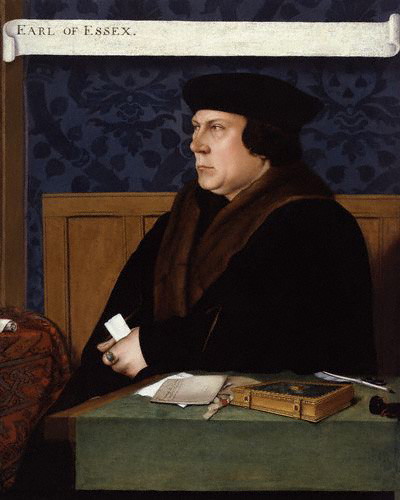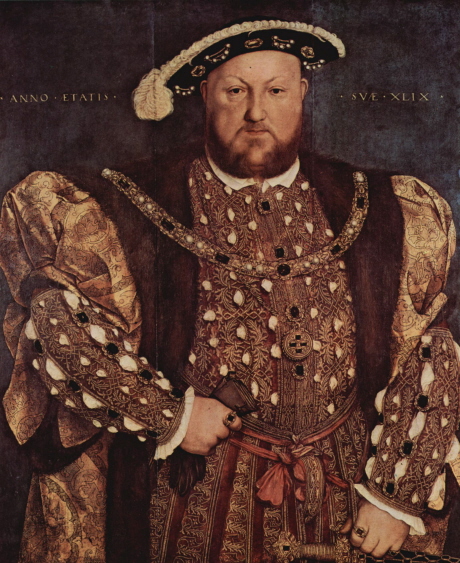
 Sometimes I drive just to listen to the voices. They produce a kind of balanced, seductive delirium. I see the woods and houses pass by, I drive carefully, and I see and hear shadows wavering inside me. The voices fill my imagination with spectacles from another place and time while my eyes track the back roads over which I wander in real time. The voice of Simon Vance* converts into the breathing, thinking, simmering bodies and voices of more characters than I can count — among them Thomas Cromwell, the peerless fixer, whose smooth, calming tones carry enough of a touch of his back-breaker days to warn off others; Cardinal Wolsey, whose voice fills with delight in luxury and at his own brilliance; Anne Boleyn, who believes in her indispensability until she cannot produce a son, and then her voice sounds as brittle as cracked bones. Voices shift and melt and are transfigured — the Duke of Norfolk, Henry VIII, and dozens more individuals — drapers, cooks, a jester, Low Country businessmen, ambassadors, builders, jailors, slab-faced, arrogant nobility; the scornful, peremptory nasal intonation of Thomas More. Mantel and Vance have reawakened the past in these two books**, and I listen with the purest pleasure inside the theater they make of my car.
Sometimes I drive just to listen to the voices. They produce a kind of balanced, seductive delirium. I see the woods and houses pass by, I drive carefully, and I see and hear shadows wavering inside me. The voices fill my imagination with spectacles from another place and time while my eyes track the back roads over which I wander in real time. The voice of Simon Vance* converts into the breathing, thinking, simmering bodies and voices of more characters than I can count — among them Thomas Cromwell, the peerless fixer, whose smooth, calming tones carry enough of a touch of his back-breaker days to warn off others; Cardinal Wolsey, whose voice fills with delight in luxury and at his own brilliance; Anne Boleyn, who believes in her indispensability until she cannot produce a son, and then her voice sounds as brittle as cracked bones. Voices shift and melt and are transfigured — the Duke of Norfolk, Henry VIII, and dozens more individuals — drapers, cooks, a jester, Low Country businessmen, ambassadors, builders, jailors, slab-faced, arrogant nobility; the scornful, peremptory nasal intonation of Thomas More. Mantel and Vance have reawakened the past in these two books**, and I listen with the purest pleasure inside the theater they make of my car.
The miles flick by, and in the 21st century on back roads, the voice also summons Cromwell’s year 1530, and his home at Austin Friars, full of children and dogs, retainers and family, all of whom live under Cromwell’s protection. I can see the fickle Henry, at 45 beginning to age and run to fat, capriciously flinging himself after women, wholly unaware of himself, without a reflective thought in his head, always searching for a way to get exactly what he wants and yet never accepting blame for anything.
Cromwell represents the leading edge of modern Europe. He is a part of the meritocracy that is displacing the nobility. He is a reformer, a pragmatist, a moderate man in fanatical times, a watcher more than a talker, a listener first, a keeper of his own opinions, except for the audience behind the wheel with whom he shares everything. He understands the devious and personal nature of conflicts over power. Mantel does not make the mistake of thinking him to be a liberal. He believes that ‘men must be governed’, he enriches himself through his offices, and he believes in the absolute right of Kings to rule. He just wants Henry to rule wisely. For two books he slips around Henry’s peevish and violent self-regard. He survives and prospers where many had been destroyed because he is brilliant and nimble. He carries scars and he remembers where he got them. Acutely perceptive of others, he remains aware of all the dangers he might encounter.
The voices create a sensuous world. In an age when famine was one bad harvest away, food is treated with reverence — apples come wrapped in linen; raisins, cinnamon, and almonds are the morsels of the wealthy. Almond and honey cakes buy confessions. Armfuls of white, silk flowers celebrate a new mother who lives in quarters decorated with tapestries woven with gold and silver thread. We also come to know the “sweating sickness’ which killed in a few hours, and we see the beggars and mendicants at the gate of every wealthy man, and we understand how women live secretly within circumscribed lives, and we are spared nothing of the effects of the belief in the supremacy of ancestry and ‘noble blood’ as if human beings were animals bred for status. The voice weaves an entire landscape of life outside of our normal expectations – Mantel has made two books that feel very close to the touch, mood and sensation of life in Tudor England. She has made the age and its people real.
When we drive, our body’s stillness and the automatic responses of our eyes, hands and feet to traffic and road conditions permit our minds to sail into all manner of thoughts and images. We dream when we drive. Adding lengthy stories to that mix is a natural extension of that dreamy awareness. So very often now, moving fast above the surface of the road, I sit unstirring, undisturbed, hushed, waiting, filling up with words and faces and rhapsodies of one more intensely imagined cosmos.
*Simon Vance: http://www.huffingtonpost.com/jeb-harrison/audiobook-lovers-meet-the-master_b_3456391.html
**Wolf Hall and Bring Up the Bodies by Hilary Mantel: I read both books soon after their publication. Listening to them changes their effects – it gives them added dimensions. It makes them more immediate somehow:
Both portraits were painted by Hans Holbein from sittings with Cromwell and Henry.